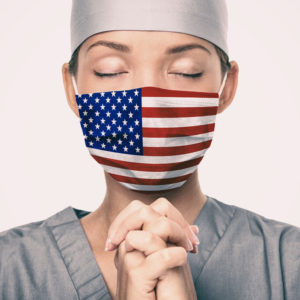The outburst of wanton violence in the United States has moved well past mere vengeance or shock over the vicious killing of a black man by a brutal, also stupid, thug wearing the uniform of a policeman in a large midwestern city.
It has let off emotions that go deep into American and world history and also right up to the present in another crisis that’s not going away any time soon.
That’s the coronavirus that’s led to the loss in the United States and elsewhere of tens of millions of jobs, of daily living wages, of the means of survival for millions who ultimately will be joining the world’s impoverished, poverty-stricken, hungry and homeless if relief doesn’t come soon.
It’s not likely that a lot of people whom we see on television smashing windows and looting stores would put their dilemma in quite those terms. No, there’s no excuse or justification for destroying valuable property, stealing costly stuff that belongs to others and ruining the lives of thousands of innocent people whose misfortune was to own shops and property where mobs were running wild.
But what did many if not most of these robbers and looters have to lose? Surely some had jobs, but most did not, or, if they worked, it was for miserable wages, for part-time shifts, gig work, for no future and no point.
For years, for all their lives, they’ve been seeing Beautiful People on screens, on lovely streets, in sleek vehicles, through wide windows in stores overflowing with luxuries and in fine restaurants, places where they’d be lucky to be sweeping the floors or washing dishes, saying, “Thank you sir/ma’am” if a nice tip is dropped their way, getting paid minimum wage and told to get lost if the boss decides he can do without them.
More than all that, while they’re lucky to get enough to feed themselves and a few kids, others, the majority of their fellow citizens are making out like bandits.
Forget about the top 1 percent or 3 percent. We know they’re doing great on a stock market only slightly rocked by the coronavirus and now the protests. Right down through the upper and middle classes, most Americans are doing pretty well.
That leaves millions who aren’t sharing the wealth, aren’t joining the party, aren’t feasting on the fun.
Men get killed every day, in every city, making a few headlines, often not good enough for the front pages of even the local papers, but the killing of a defenseless black man by a cop in the name of law and order was more than another death in the neighborhood.
It was a spark that triggered the deepest emotions, salt in long-festering wounds, the final indignity that touched off the deepest sense of rage, of hatred for the masses of those above them who may not all be that wealthy but who live in relative comfort, secure from hunger, able to pay the rent or mortgage and own a car or two.
It would actually be skewing the picture to say that this resentment, now boiling over, is a racial thing. Sure, resentment among blacks goes back to an era that formally ended with the abolition of slavery in the Civil War but endures in the form of discrimination, violence and suffering to this day.
Blacks, and in recent decades Latinos and Hispanics, share common cause, but so do millions of others, poor whites who deeply resent blacks and Latinos as competitors for crumbs off the table of the rich. They too are victims of social and economic prejudice and repression.
Koreans have their own keen sense of discrimination for reasons of social class and educational background, income distribution and regional origins, among others. A miracle of Korean history since the bloody Gwangju revolt of 40 years ago is that it has been mostly non-violent.
Hundreds of thousands have taken to the streets since the 1987 democracy movement, most recently in the Candlelight revolution of 2016 that pitched out the conservative president, but these outpourings have been relatively peaceful.
The American revolution may be broader, more diffused geographically, ethnically and in other ways quite different from the Korean experience and that in other countries. American-style democracy, however, has been an exemplar for democratic movements around the world.
In the next few months, in a presidential campaign like none other, in a pandemic of the coronavirus, protest and violence, U.S.-style democracy faces its severest trial since the Civil War.
The world is waiting to see if democracy passes the test.

